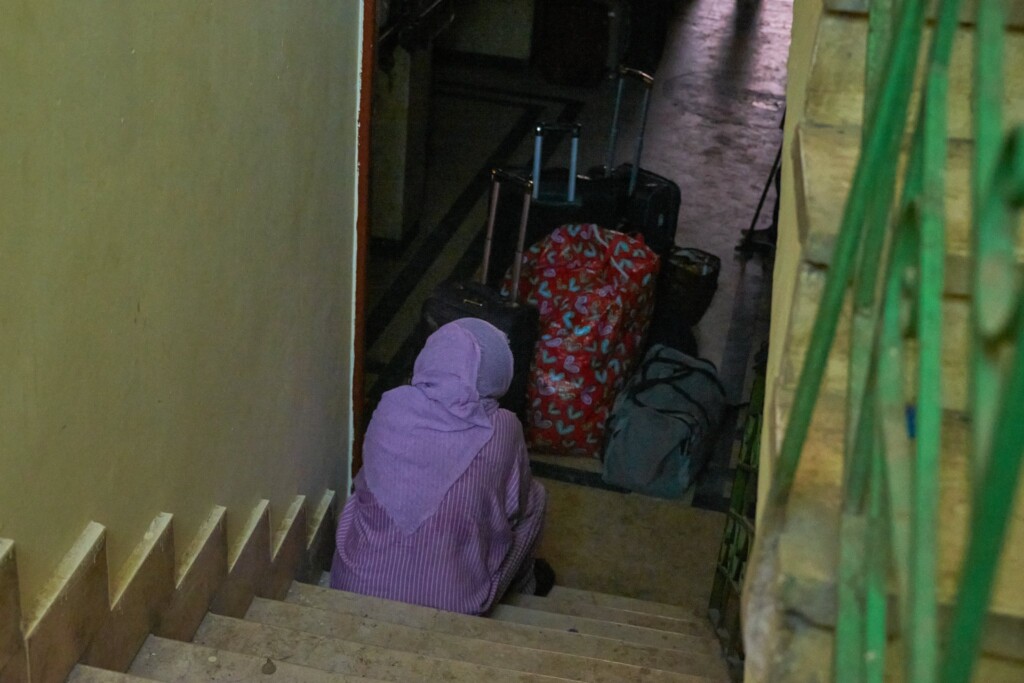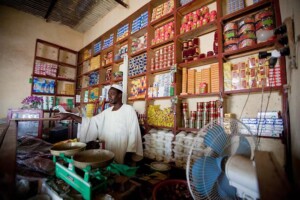Economic analyst: Sudan in ‘depths of economic abyss’

Sudanese person sits next to their packed luggage after fleeing the Sudan war to Egypt, September 7 (Photo: Sari Omer / social media)
In an interview with Radio Dabanga, economic analyst Kamal Karrar said that the continuation of the war for more than five months caused the country’s overall economic collapse. Civil society activists criticise the acting Ministry of Health’s decision to deal with all pharmaceutical aid coming from abroad.
As the exchange rate of the dollar against the pound jumped to more than SDG780 in the parallel market on Monday, while its price in banks reached SDG632, he explained that the war has brought the country to the depths of the economic abyss.
On the same day, the Bank of Khartoum announced that free-of-charge money transfers can now be sent from the Kingdom of Saudi Arabia to Sudan using Enjaz Easy.
Currency dealers told Radio Dabanga that there was a high demand for dollars outside Sudan, which led to an unprecedented rise in prices. Travel from Sudan has increased following the resumption of passport processing in August.
Inflation rates
“All economic indicators such as the agricultural season, services, exports and imports, and the war have stopped due to the war and the absence of a government,” said Karrar.
In June, the CBoS established an emergency room for the management of banking procedures as part of measures to tackle the disruptions in banking services caused by the ongoing war. At the time, the CBoS acknowledged the impact of the fighting, vandalism and war-related issues on banks, including electricity outages and communication issues.
Karrar warned of continued high inflation rates and the devaluation of the Sudanese currency by up to 30 per cent, which impacts the economic and living conditions of workers who still have not been paid.
“Money is being spent on military operations, while the Sudanese live on grants and donations from their families abroad,” said Karrar. “Limited assistance is being provided by various international parties.”
Minister of Finance Jibril Ibrahim said in a press statement on Sunday that the real challenge after the war will be the lack of revenue, as the Sudanese state depends on taxes as a basic resource.
Pharmaceutical aid
Civil society activist Bashir El Sadig criticised the acting Ministry of Health’s decision to deal with all pharmaceutical aid coming from abroad.
El Sadig, director of Ahlam organisation, told Radio Dabanga that the Sudanese Health Ministry will prevent aid organisations from distributing medicines themselves to areas of need, and oblige them to hand the relief items to the ministry.
The activist described the humanitarian situation in Khartoum as “dire.” People are struggling to have their basic needs met, especially medicine and food, he said. “There are no safe corridors in Khartoum, which is disastrous, considering the severe food and medicines shortages.” He warned that people suffering from kidney disease, cancer, and other chronic diseases will be much worse off.
The director of the Sudanese El Zarga Organisation Mustafa Adam reported in June that “the warehouses of the state Ministry of Finance and the governmental Humanitarian Aid Commission (HAC) are filled with humanitarian aid items that arrived two months ago.”
In February, Sudan’s National Commission for Human Rights expressed deep concern over the measures the Humanitarian Aid Commission (HAC) had taken against a number of civil society organisations. The HR Commission blamed HAC for impeding the freedom of civil society work, by refusing to register or re-register NGOs and grassroots organisations.











 and then
and then